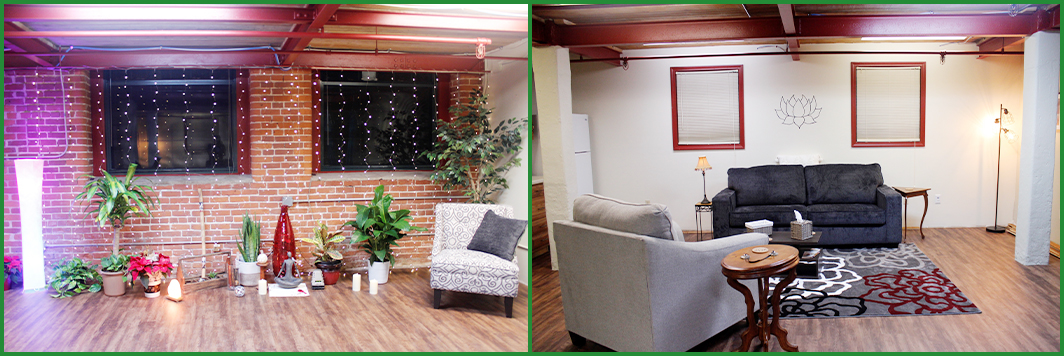Where is your office located?
1 Springfield Street
Commercial #3
Chicopee, MA 01013
I realized one of my dreams by finding space in a renovated mill in Chicopee, Massachusetts. It’s super easy to find and within 20 minutes of many local cities and towns.
What is your office like?

How long are the sessions?
What can I expect in a consultation?
The consultation is a chance for us to build our initial connection. It’s also a time we can answer each other’s questions.
I prefer holding our consultation on Zoom or in person. If either of those is not possible, we can chat by phone.
What type of therapy do you provide?
Isn’t therapy just talking and crying?
As mentioned above, talking is one component of sessions, but we can use other approaches to process situations and emotions. These approaches can be beneficial because, sometimes, it’s hard to find the most precise words to express yourself.
Crying? It may or may not happen.
Either way, all of you is welcome.
Do you accept insurance?
I choose not to accept insurance for several reasons. First, insurance companies require me to provide a diagnosis – often after I’ve spent only an hour with you. And while a diagnosis can be helpful, it can also be limiting.
Having a diagnosis can often label you, and I’m not comfortable with that.
Insurance companies often identify what they – as opposed to you and I – consider the appropriate time you need to work toward healing.
Finally, insurance companies also only allow certain approaches to therapy, leaving out much of what my clients and I have found beneficial; e.g., grounding techniques, meditation, or trauma-sensitive yoga etc.
What do you enjoy about your career?
What experience do you have?
I earned my bachelor’s degree from Regis College in Weston, Massachusetts, and my master’s degree in Counseling Psychology from Assumption College in Worcester, Massachusetts.
For 30-plus years, I’ve also been working with people of all ages who have experienced trauma at some point in their lives.
I see you facilitate trauma-sensitive yoga (TCTSY). What is that?
I facilitate a specific type of yoga called Trauma Center Trauma Sensitive Yoga. I like to call it “Your yoga. Your way.” It’s high in invitational language, it’s not hands-on, and it provides participants opportunities to regain power altered or taken in traumatic events.
People often incorporate the power experienced in sessions into other life experiences.
Do you have to earn a certification in trauma-sensitive yoga?
If we’re doing yoga, do I have to wear yoga clothes?
Yoga clothes do not make a yoga practice. If you’d like to, that’s fine.
However, I encourage you to wear what makes you comfortable, with the exception of short shorts or revealing shirts.
What if I think my body doesn’t fit what our culture typically shows as “yoga bodies?”
What if I try TCTSY, and I’m still not sure?
Where did you grow up?
What did you enjoy doing in your childhood?
I was part of the generation that still played outside with neighborhood friends and went in when the streetlights came on. You could find me playing any sport in the street, exploring the pond, or – my all-time favorite – climbing trees.
My friend’s mother’s frequent story was that she met me when she looked out her second-story window and came eye-to-eye with me.
